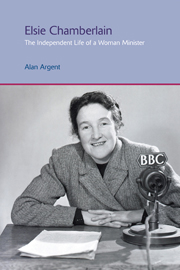Book contents
- Frontmatter
- Dedication
- Contents
- List of Illustrations
- Acknowledgements
- 1 Introduction and Early Life
- 2 The Call to the Ministry
- 3 Elsie Begins Her Ministry, 1939
- 4 The Return to London, 1941
- 5 Flying into the Storms: Chaplain in the Royal Air Force, 1945
- 6 A Season of Clear Shining: Married Life
- 7 Vineyard Congregational Church, Richmond-upon-Thames
- 8 Later Years at Vineyard
- 9 International Meetings and the CUEW Chair
- 10 Elsie at the BBC
- 11 After the BBC: The City Temple
- 12 The Sky Turns Black: Another Crisis
- 13 Sometimes a Light Surprises: The Congregational Federation
- 14 Hutton Free Church, 1971
- 15 A Local Thunderstorm: The Kentish Town Situation
- 16 Presidential Duties and Travelling, 1973–1980
- 17 Going West, 1980
- 18 Ministry in Nottingham, 1984–1991
- 19 Epilogue
- Bibliography
- Index
13 - Sometimes a Light Surprises: The Congregational Federation
- Frontmatter
- Dedication
- Contents
- List of Illustrations
- Acknowledgements
- 1 Introduction and Early Life
- 2 The Call to the Ministry
- 3 Elsie Begins Her Ministry, 1939
- 4 The Return to London, 1941
- 5 Flying into the Storms: Chaplain in the Royal Air Force, 1945
- 6 A Season of Clear Shining: Married Life
- 7 Vineyard Congregational Church, Richmond-upon-Thames
- 8 Later Years at Vineyard
- 9 International Meetings and the CUEW Chair
- 10 Elsie at the BBC
- 11 After the BBC: The City Temple
- 12 The Sky Turns Black: Another Crisis
- 13 Sometimes a Light Surprises: The Congregational Federation
- 14 Hutton Free Church, 1971
- 15 A Local Thunderstorm: The Kentish Town Situation
- 16 Presidential Duties and Travelling, 1973–1980
- 17 Going West, 1980
- 18 Ministry in Nottingham, 1984–1991
- 19 Epilogue
- Bibliography
- Index
Summary
It has been suggested that the formation of the United Reformed Church in 1972 caused Elsie Chamberlain ‘more distress than anything else’ in her ministry – a bold claim in a stormy life! Some of her friends found Elsie's decision not to join the United Reformed Church bewildering. One woman minister knew that Elsie objected to the Basis of Union between the Congregationalists and the Presbyterians but did not really know why. Another felt that Elsie simply had not studied that basis properly. Yet another friend believed that Elsie had stayed out of the United Reformed Church because she felt that in it there would be people, trying ‘to order her about’, although he readily conceded that she would have been a ‘presence’ at assemblies and that the United Reformed Church would have been ‘richer and more effective’, had she joined it. Kenneth Slack, as late as February 1972, still hoped that Elsie would change her mind and join the United Reformed Church. He stated that otherwise she would be missed for herself but ‘more seriously’ she would be missed for ‘the challenge’ she would bring, as United Reformed Church ministers and members adjusted the scheme in the light of experience. Another minister wanted Elsie to think again simply because ‘we don't want to lose her from the family’. The difficulty with that was that the existing family was rightly or wrongly dividing anyway and the United Reformed Church was not a family of which she wished to be a part.
- Type
- Chapter
- Information
- Elsie ChamberlainThe Independent Life of a Woman Minister, pp. 151 - 162Publisher: Acumen PublishingPrint publication year: 2012



